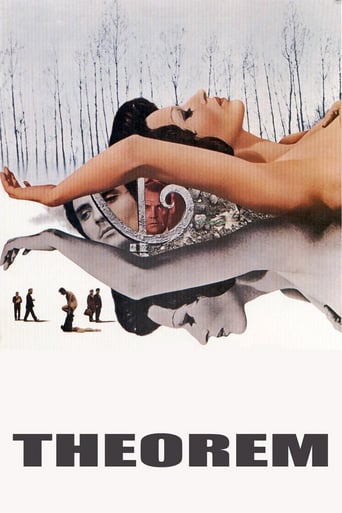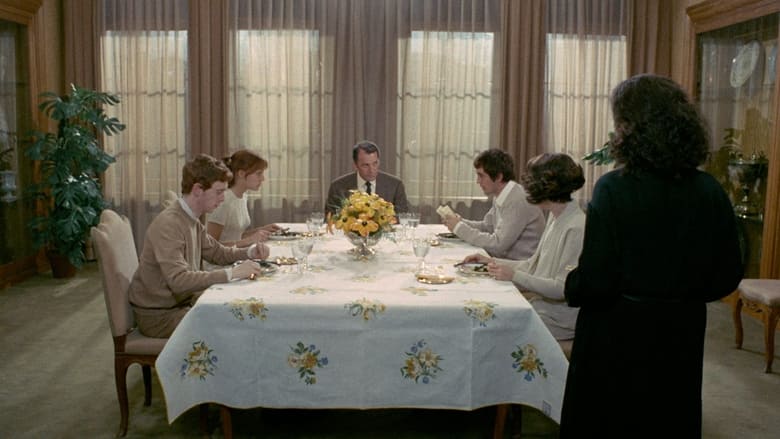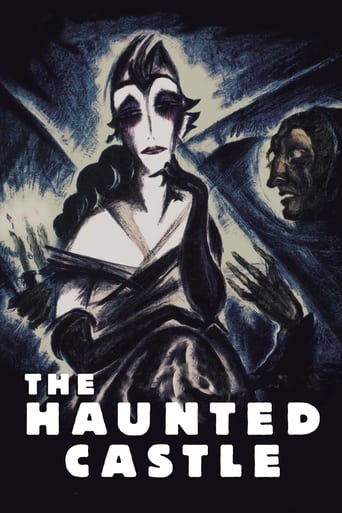

Theorem (1969)
A wealthy Italian household is turned upside down when a handsome stranger arrives, seduces every family member and then disappears. Each has an epiphany of sorts, but none can figure out who the seductive visitor was or why he came.
Watch Trailer
Cast


Similar titles
Reviews
Pier Paolo Pasolini's "Teorema" had me dumbfounded! It was one of those rare instances where I was unable to formulate a clear opinion of what I thought about it. For one, this minimalist picture from the controversial filmmaker has "art-house" written all over it. Yes, there is extreme minimalism, very little dialog (it seems the number of actual spoken words in the film is about 923!). This almost silent film is allegorical rife with symbolism and religious connotations, and may not be a very interesting subject matter for those looking at mainstream cinema, that is for sure! Terence Stamp is "The Visitor", a mysterious stranger who once visits the mansion of a rich family of four. The man of the house is Paolo, a rich businessman who owns a factory, and then there's his awkward son, a daughter, a beautiful wife who is sexually repressed and a scary-looking maid. In the next few days that pass, this visitor has sexual encounters with each of the inhabitants of the house! In a way, he "seduces" them. And almost as suddenly as he appears, he soon takes leave of them, leaving them in a state like never before! All of these people he "touched" exhibit marked changes in their lives, of a different level altogether! The "consequences" forms the crux of this strange film and paves way for detailed discussion! What makes Pasolini's film so important is the daring concept that Pasolini presents to his viewers with a script set in the contemporary world. From what I understand, The visitor is supposed to be a God-send or an angel who influences the members of the house in one way or another. Why "sexually" is a good question, but that depends on how you see it. Is it the touch of God, or the Devil's seduction? Perhaps it is symbolic of a "close encounter with God"? So what exactly does God do to these bourgeois individuals? Apparently he makes them see beyond their pretentious cocooned life. They all go through a self-realization phase, which they all confess one by one to the Visitor when it is time for him to leave. But he isn't there to see the changes. Are these changes always positive? Does being "blessed" always lead to happiness? Or is there another side to it? Pasolini, through his seemingly simple yet highly complex allegory poses these ambiguous questions, which likely polarized his audiences, based on their religious beliefs! Being an atheist I wasn't particularly offended or overwhelmed with the subject, but I was definitely intrigued by how drastically different this film and its viewpoint is! Pasolini's technique of story-telling is poetic! It is almost like Pasolini deliberately chose the visual style as exists in the film to give it a meditative form. Long takes, solitude, mostly gentle atmosphere, intermittent random scenes of a vast empty desert, the presence of a radiant light just before the visitor appears, all tactfully done! The visuals are also enchanting, the cinematography is beautiful, with the colours changing from sepia (in the beginning during the introduction of the characters, perhaps to show their 'ordinary' life?) to vividly colourful (a marked change with the introduction of the "visitor"?). It is then, mostly on the technical front and the handling of the film with its layered theme that makes "Teorema" most watchable.Where it falters is in some (only a couple or three) haphazard sequences here and there, and in the tepid acting from the actors playing the son and the daughter. I don't know if it was intentional but the daughter, Odetta (Anne Wiazemsky) who also appeared in Robert Bresson's "Au Hasard Balthazar" delivers what could be one of the most wooden acting performances I've seen! At one point it even becomes slightly apparent that she is reading her lines from cue cards!! The son, Pietro is played by Andrés José Cruz Soublette also seems somewhat awkward, but maybe his acting reflects his character who behaves like that owing to being a closeted homosexual! The finest acting then comes from Terence Stamp, even though he doesn't have much to do except give mysterious smiles once in a while and appear compassionate! A close second best actor in the film is the beautiful Silvana Magnano, the lady of the house. Her Lucia's perplexed state of mind is wonderfully portrayed by the actress. Also impressive is Laura Betti as Emilia, the maid. Laura looks and acts the weird Emilia quite earnestly.But how does one eventually evaluate and rate something as flummoxing as "Teorema"? Why is it even called that anyway? ('Teorema' means 'Theorem') There are views that the structure of the film itself and the psychological transformation of all characters follow a single formulaic structure! The film doesn't boast of great acting, neither is it an intimate character portrait. Not all characters are dug deep into. The subject matter is not what one would fall in love with, but it sure is extremely interesting! But in spite of this, there is something about "Teorema" that makes it worthwhile. While the visuals and the characters haunt your memory long after the film is over, the happenings in the narrative will give you something to ponder about. It is not a film one may go ga-ga about, but can one ever forget having watched "Teorema"? Hell, no! Score: 8/10.
You may call me a seasoned film watcher who is willing to ponder over the possible intentions of the narrative. However, to me the film Teorema is devoid of any rational or logical meaning. A possible label of the style is surrealism, but surrealists employ a certain realism, albeit twisted, accuracy and precision. The story of Teorema is too sloppy and incoherent for that. Perhaps the best description is to compare the story to (post)modern art, which carries a similar message of laziness, fraud and swindle. In order to warn you, let me briefly sketch the events. The main characters are a bourgeois family, consisting of two parents, a son, a daughter and a housekeeper. A friend of the son visits the family, and starts sexual relations with everybody, except perhaps the father. He does not seduce them, but simply yields to their wishes. When he leaves, the inmates admit that their lives have been shattered. The housekeeper becomes a saint with divine powers, and finally merges with the earth. This daughter gets into a state of coma. The mother becomes a promiscuous nymphomane. The male characters develop the most interesting signs of disorder. The father wants to go back to his inner self. He gives his possessions to his employees, undresses, and runs into the desert. The son becomes a painter, who hides his lack of skills under a mask of conceit. There are certainly allusions in the film, but none of them takes the lead. For instance, it is possible that the painter is meant to portray the film maker, but the evidence is poor. Evidently, the film in itself makes no sense whatever, so that we have to base our interpretation on other sources. It was made in the days of la nouvelle vague, which produced films like "Tout va bien" (France) and "De minder gelukkige terugkeer van Joszef Katus naar het land van Rembrandt" (Netherlands). These stories are somewhat mysterious, and invite the viewer to make his own interpretation. The viewer is supposed to become a participant, and in fact the players sometimes directly address the audience. Typical for the nouvelle vague is also the moving camera. In Teorema these ideas are carried through to the extreme, leading to the above bizarre result. Another source is the Italian society. In those days she was a bizarre mixture of Bolshevism and Catholicism. A film maker had to address both cultures in order to create a commercial success. The only way to please both audiences is to say nothing, and this is precisely what Teorema does. Both the Bolshevists and Catholics are appeased by the display of their symbols, and the Catholics are only mildly provoked, suggesting that Pasolini is one of theirs. In fact the catholic spirit permeates most Italian films, even "La terra trema", which is supposed to be a socialist produce. You can not wipe out two millenia of history in a view decades. In conclusion, even the context of Teorema does not allow a satisfactory interpretation. The film can be seen as a glorification of Catholicism, socialism, promiscuity, art and culture, Freudian psychology, or simple life. Perhaps the wrath of God is actually the best explanation for the events. However, in another interpretation it is a plea for fascism or chastity. Or perhaps it is a self-portrait of the makers, and the chaos in their brains. Or the chaos of the (any) elite, which would be alarming. Only one thing is certain: Teorema is innovative. But not every innovation is an improvement. If you prefer social realism, consider seeing my other reviews.
Pier Paolo Pasolini's "Teorema" reflects in a surrealistic way three instances of a bourgeois family after one strange event happen to them, and that is the visit of a strange man (played by Terence Stamp) and the changes he caused in their lives.The strange visitor appears out of the blue in this house, seducing the religious maid, the sexually repressed mother, the timid and homosexual son, the even more timid daughter and the tormented father, teaching them something and then leaves letting all of them surprised and delivered to their own luck. When I write 'seducing' it is exactly what you think, this man has, in one way or another, some sexual relation with all the members of the family (or it is implied that he had, nothing is shown right on the face, and other times the scene suggests something sexual). After the departure of this man the family doesn't know how to continue with their lives and the second half of the movie is all about the changes he caused in the family and the strange things all of the members will do with their lives, following their awkward desires, fulfilling empty spaces (which is better not to be mentioned here).Terence Stamp's character is a strange force that works as an amalgam to the things in life that makes people complete, happy, feeling that everything's fine and when this thing is taken away everything falls apart. To the viewer this can be interpreted as anything (love, money, sex, religion, material things, drugs, etc). But if you look to what Pasolini was and his views on things you might think that his critic is against the bourgeois, the wealthy, their emptiness and hypocrisies. And it is a critic, a good one! What's left to say? Many people will not get the movie's idea and we'll be shocked by the story or find it boring. The story is presented a little bit of order, there's some small moments where the viewers try to understand what's happening when Pasolini shows some scenes filmed in a desert, but the conclusion answers all. "Teorema" has great performances by the cast and a repetitive strange music composed by Ennio Morricone. One of the best films ever made, "Teorema" is a must see for Pasolini fans, for those who enjoy complex narratives, and for everyone who enjoys relevant society criticisms presented on film. Interpretations may vary. 10/10
"There are only 923 words spoken in "Teorema" - but it says everything!", brags the tagline. It makes some sense, since Pasolini's film feels like a rhythmic visual poem with scattered dialogue. "Teorema" looks and feels like a haunting silent film integrated with sparse dialogue - failed attempts of communication and change among the characters.A beautiful and enigmatic visitor (a young Terence Stamp, one of the intriguing, almost androgynous cult sex figures of the 60's, along the lines of a Udo Kier and others) seduces and then leaves each member of a bourgeois family. The father (Massimo Girotti, of Visconti's "Ossessione"), the mother (Silvana Mangano, "Death in Venice"), the daughter (Anne Wiazemsky, of Bresson's "Au Hasard Balthazar" and Godard's then wife), the son (Andrés José Cruz Soublette) and even the housemaid (Laura Betti, best actress at the Venice Film Festival for this performance) are all altered by the visitor's sexual presence in their lives, and each will try to find salvation or catharsis once they're abandoned. Their ways can be seen as an allegory of the fears and misconceptions of those trapped in their own conventions, and the tragic consequences of their failed attempts to get away - after the visitor, an hedonistic angel of death, tricked them with false hopes of sexual and emotional liberation. At least, that's how I see it - which I wouldn't dare to claim as an ultimate view on it. As enigmatic and haunting the images in "Teorema" are, they ask for repeated viewings. And just the fact that they give you enough interest for a second look, it's quite a feat. An interesting, cerebral cinematic exercise, to say the least. 8.5/10.











